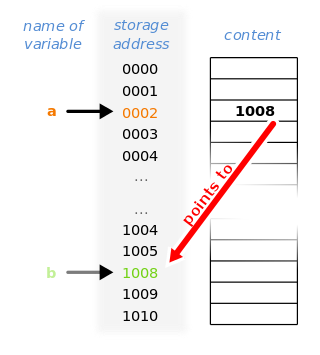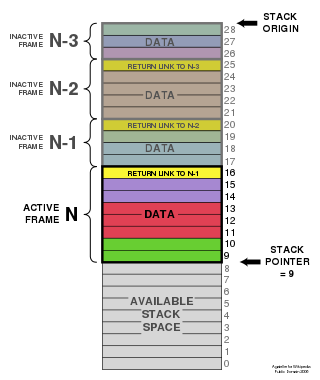
In computer science, garbage collection (GC) is a form of automatic memory management. The garbage collector attempts to reclaim memory which was allocated by the program, but is no longer referenced; such memory is called garbage. Garbage collection was invented by American computer scientist John McCarthy around 1959 to simplify manual memory management in Lisp.
In computer science, reference counting is a programming technique of storing the number of references, pointers, or handles to a resource, such as an object, a block of memory, disk space, and others.
OCaml is a general-purpose, high-level multi-paradigm programming language which extends the Caml dialect of ML with object-oriented features. OCaml was created in 1996 by Xavier Leroy, Jérôme Vouillon, Damien Doligez, Didier Rémy, Ascánder Suárez, and others.

Memory management is a form of resource management applied to computer memory. The essential requirement of memory management is to provide ways to dynamically allocate portions of memory to programs at their request, and free it for reuse when no longer needed. This is critical to any advanced computer system where more than a single process might be underway at any time.
In computer programming, a reference is a value that enables a program to indirectly access a particular data, such as a variable's value or a record, in the computer's memory or in some other storage device. The reference is said to refer to the datum, and accessing the datum is called dereferencing the reference. A reference is distinct from the datum itself.
The buddy memory allocation technique is a memory allocation algorithm that divides memory into partitions to try to satisfy a memory request as suitably as possible. This system makes use of splitting memory into halves to try to give a best fit. According to Donald Knuth, the buddy system was invented in 1963 by Harry Markowitz, and was first described by Kenneth C. Knowlton. The Buddy memory allocation is relatively easy to implement. It supports limited but efficient splitting and coalescing of memory blocks.
C dynamic memory allocation refers to performing manual memory management for dynamic memory allocation in the C programming language via a group of functions in the C standard library, namely malloc, realloc, calloc, aligned_alloc and free.
In computer programming, tracing garbage collection is a form of automatic memory management that consists of determining which objects should be deallocated by tracing which objects are reachable by a chain of references from certain "root" objects, and considering the rest as "garbage" and collecting them. Tracing garbage collection is the most common type of garbage collection – so much so that "garbage collection" often refers to tracing garbage collection, rather than other methods such as reference counting – and there are a large number of algorithms used in implementation.

In computer science, a pointer is an object in many programming languages that stores a memory address. This can be that of another value located in computer memory, or in some cases, that of memory-mapped computer hardware. A pointer references a location in memory, and obtaining the value stored at that location is known as dereferencing the pointer. As an analogy, a page number in a book's index could be considered a pointer to the corresponding page; dereferencing such a pointer would be done by flipping to the page with the given page number and reading the text found on that page. The actual format and content of a pointer variable is dependent on the underlying computer architecture.

Stacks in computing architectures are regions of memory where data is added or removed in a last-in-first-out (LIFO) manner.
In the C++ programming language, new and delete are a pair of language constructs that perform dynamic memory allocation, object construction and object destruction.
In computer storage, fragmentation is a phenomenon in which storage space, main storage or secondary storage, is used inefficiently, reducing capacity or performance and often both. The exact consequences of fragmentation depend on the specific system of storage allocation in use and the particular form of fragmentation. In many cases, fragmentation leads to storage space being "wasted", and in that case the term also refers to the wasted space itself.
Slab allocation is a memory management mechanism intended for the efficient memory allocation of objects. In comparison with earlier mechanisms, it reduces fragmentation caused by allocations and deallocations. This technique is used for retaining allocated memory containing a data object of a certain type for reuse upon subsequent allocations of objects of the same type. It is analogous to an object pool, but only applies to memory, not other resources.
In computer science, manual memory management refers to the usage of manual instructions by the programmer to identify and deallocate unused objects, or garbage. Up until the mid-1990s, the majority of programming languages used in industry supported manual memory management, though garbage collection has existed since 1959, when it was introduced with Lisp. Today, however, languages with garbage collection such as Java are increasingly popular and the languages Objective-C and Swift provide similar functionality through Automatic Reference Counting. The main manually managed languages still in widespread use today are C and C++ – see C dynamic memory allocation.
Memory safety is the state of being protected from various software bugs and security vulnerabilities when dealing with memory access, such as buffer overflows and dangling pointers. For example, Java is said to be memory-safe because its runtime error detection checks array bounds and pointer dereferences. In contrast, C and C++ allow arbitrary pointer arithmetic with pointers implemented as direct memory addresses with no provision for bounds checking, and thus are potentially memory-unsafe.
In C++ computer programming, allocators are a component of the C++ Standard Library. The standard library provides several data structures, such as list and set, commonly referred to as containers. A common trait among these containers is their ability to change size during the execution of the program. To achieve this, some form of dynamic memory allocation is usually required. Allocators handle all the requests for allocation and deallocation of memory for a given container. The C++ Standard Library provides general-purpose allocators that are used by default, however, custom allocators may also be supplied by the programmer.
In computer programming, a variable is an abstract storage location paired with an associated symbolic name, which contains some known or unknown quantity of information referred to as a value; or in simpler terms, a variable is a named container for a particular set of bits or type of data. A variable can eventually be associated with or identified by a memory address. The variable name is the usual way to reference the stored value, in addition to referring to the variable itself, depending on the context. This separation of name and content allows the name to be used independently of the exact information it represents. The identifier in computer source code can be bound to a value during run time, and the value of the variable may thus change during the course of program execution.
In computer science, region-based memory management is a type of memory management in which each allocated object is assigned to a region. A region, also called a zone, arena, area, or memory context, is a collection of allocated objects that can be efficiently reallocated or deallocated all at once. Like stack allocation, regions facilitate allocation and deallocation of memory with low overhead; but they are more flexible, allowing objects to live longer than the stack frame in which they were allocated. In typical implementations, all objects in a region are allocated in a single contiguous range of memory addresses, similarly to how stack frames are typically allocated.
In operating systems, memory management is the function responsible for managing the computer's primary memory.
Android Runtime (ART) is an application runtime environment used by the Android operating system. Replacing Dalvik, the process virtual machine originally used by Android, ART performs the translation of the application's bytecode into native instructions that are later executed by the device's runtime environment.



